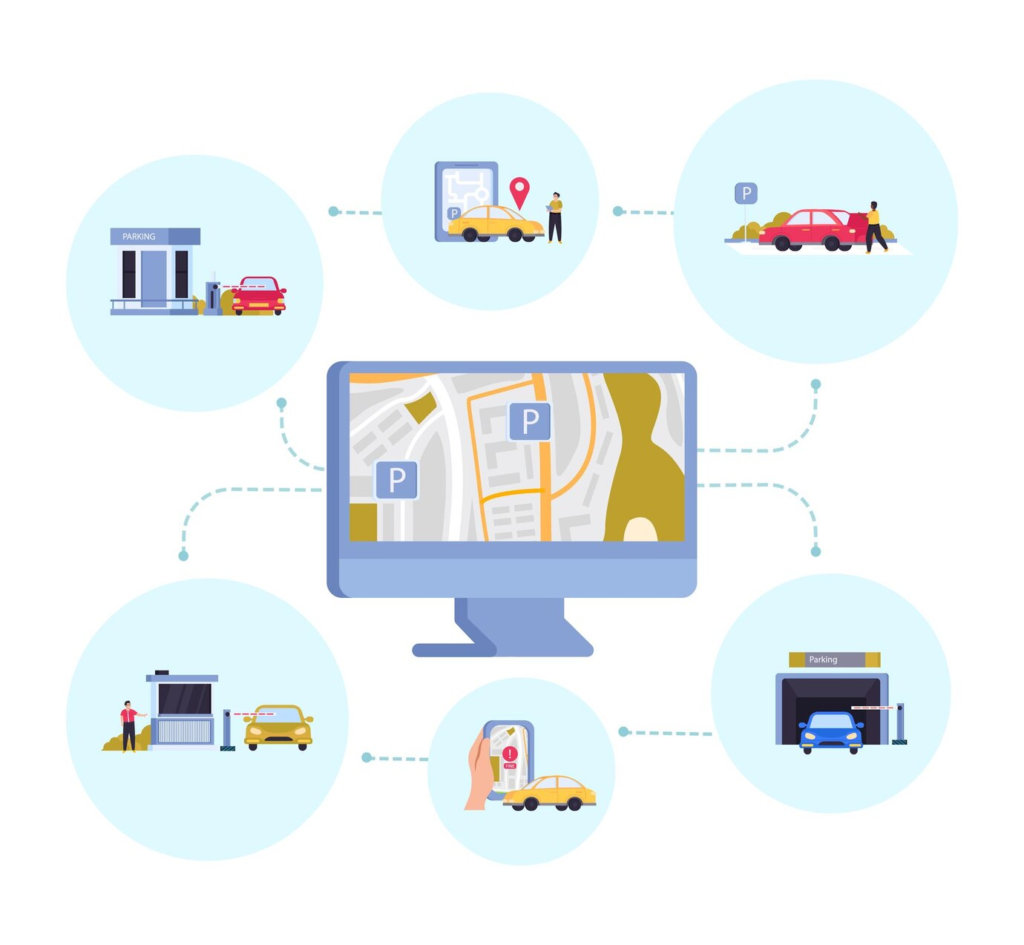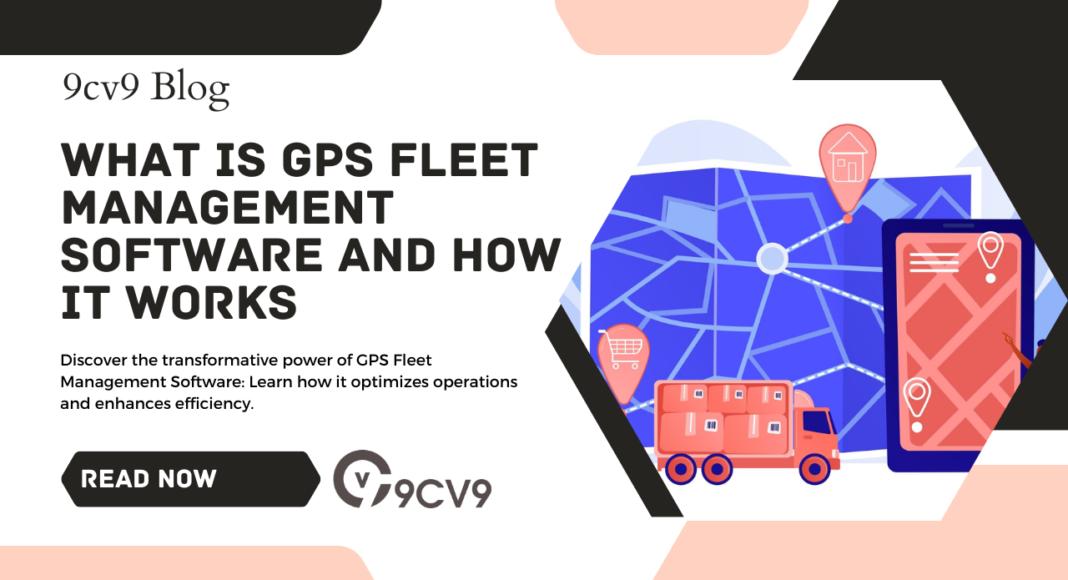Key Takeaways
- Optimize Operations: GPS Fleet Management Software revolutionizes fleet management with real-time tracking and route optimization, enhancing efficiency and reducing costs.
- Enhance Safety: Monitor driver behavior and ensure compliance with safety regulations, promoting safer driving practices and minimizing risks.
- Drive Business Growth: Harness the power of GPS Fleet Management Software to streamline operations, improve customer service, and stay ahead of the competition in a dynamic marketplace.
In the dynamic landscape of modern business operations, efficiency is paramount.
Whether you’re overseeing a fleet of delivery vehicles, managing a transportation company, or coordinating service vehicles, the ability to monitor, track, and optimize your fleet’s movements is indispensable.
Enter GPS Fleet Management Software – the technological marvel that revolutionizes the way businesses manage their fleets.

But what exactly is GPS Fleet Management Software, and how does it operate?
In this comprehensive guide, we embark on a journey to unravel the intricate workings of this transformative technology, shedding light on its functionalities, benefits, and the mechanisms that drive its efficacy.
Picture this: a seamless orchestration of vehicles navigating through bustling streets, optimized routes minimizing fuel consumption, real-time monitoring ensuring adherence to schedules, and data-driven insights empowering strategic decision-making.
This is the essence of GPS Fleet Management Software – a sophisticated system designed to streamline fleet operations and elevate efficiency to unprecedented levels.
At its core, GPS Fleet Management Software harnesses the power of Global Positioning System (GPS) technology to provide real-time tracking, monitoring, and management of fleets.
But its capabilities extend far beyond mere location tracking.
It’s a multifaceted tool equipped with a myriad of features and functionalities aimed at enhancing every facet of fleet management.
From route optimization and vehicle maintenance scheduling to driver behavior monitoring and compliance management, GPS Fleet Management Software offers a comprehensive suite of solutions tailored to address the diverse needs of fleet-based businesses.
By integrating GPS tracking devices, sensors, and robust software platforms, it transforms raw data into actionable insights, empowering businesses to operate with unparalleled efficiency and precision.
But how exactly does GPS Fleet Management Software work its magic? What are the underlying mechanisms that enable this technology to revolutionize fleet operations?
In the following sections, we’ll delve deep into the operational dynamics of GPS Fleet Management Software, unraveling its intricacies and shedding light on the pivotal role it plays in reshaping the future of business logistics.
Join us as we embark on an enlightening journey to demystify GPS Fleet Management Software – from its fundamental principles to its transformative impact on businesses worldwide.
Whether you’re a seasoned fleet manager seeking to optimize operations or an entrepreneur exploring innovative solutions, this guide is your roadmap to unlocking the full potential of GPS technology in fleet management.
So buckle up and prepare for a voyage into the realm of efficiency, optimization, and unparalleled insight – courtesy of GPS Fleet Management Software.
Before we venture further into this article, we like to share who we are and what we do.
About 9cv9
9cv9 is a business tech startup based in Singapore and Asia, with a strong presence all over the world.
With over eight years of startup and business experience, and being highly involved in connecting with thousands of companies and startups, the 9cv9 team has listed some important learning points in this overview of What is GPS Fleet Management Software and How it Works.
If your company needs recruitment and headhunting services to hire top-quality employees, you can use 9cv9 headhunting and recruitment services to hire top talents and candidates. Find out more here, or send over an email to [email protected].
Or just post 1 free job posting here at 9cv9 Hiring Portal in under 10 minutes.
What is GPS Fleet Management Software and How it Works
- Understanding GPS Fleet Management Software
- How GPS Fleet Management Software Works
- Benefits of GPS Fleet Management Software
- Choosing the Right GPS Fleet Management Software
1. Understanding GPS Fleet Management Software
Definition and Basic Components
- Definition: GPS Fleet Management Software is a comprehensive system designed to track, monitor, and manage fleets of vehicles using Global Positioning System (GPS) technology.
- Basic Components:
- GPS Tracking Devices: Installed in vehicles to gather real-time location data.
- Software Platform: Centralized interface for fleet managers to access and analyze data.
- Sensors and Telematics: Collect additional vehicle information such as speed, fuel consumption, and engine diagnostics.
- Communication Networks: Enable data transmission between vehicles and the software platform.

Role of GPS Tracking Technology
- Real-Time Location Tracking: Provides precise location data for each vehicle in the fleet.
- Geo-Fencing: Defines virtual boundaries, triggering alerts when vehicles enter or exit specified areas.
- Historical Data Analysis: Enables retrospective analysis of vehicle routes and performance.
Common Features and Functionalities
- Route Optimization: Utilizes real-time traffic data and historical patterns to identify the most efficient routes for vehicles.
- Example: A delivery company uses GPS Fleet Management Software to optimize routes, reducing delivery times and fuel costs.
- Vehicle Maintenance Scheduling: Monitors vehicle health and schedules maintenance tasks based on usage and diagnostic data.
- Example: A transportation company schedules routine maintenance for its vehicles, preventing breakdowns and extending their lifespan.
- Driver Behavior Monitoring: Tracks driver behavior such as speeding, harsh braking, and idling, promoting safer driving practices.
- Example: A logistics company identifies drivers with high instances of harsh braking and provides targeted training to improve safety.
- Fuel Management: Monitors fuel levels and consumption, identifying inefficiencies and reducing fuel costs.
- Example: A taxi fleet owner analyzes fuel consumption data to identify vehicles with poor fuel efficiency and takes corrective measures.
- Compliance Management: Ensures adherence to regulatory requirements such as Hours of Service (HOS) regulations and vehicle inspections.
- Example: A trucking company uses GPS Fleet Management Software to track drivers’ hours of service, ensuring compliance with regulations and avoiding fines.
Integration with Mapping Software
- Seamless Integration: Interfaces with mapping software to provide detailed maps, traffic information, and navigation features.
- Route Visualization: Displays optimized routes and real-time traffic updates for efficient navigation.
- Customization: Allows customization of maps and routes based on specific business needs and preferences.
Advanced Analytics and Reporting
- Data Analysis Tools: Offers advanced analytics capabilities to derive actionable insights from fleet data.
- Custom Reports: Generates customizable reports on various metrics such as vehicle utilization, fuel efficiency, and driver performance.
- Predictive Analytics: Utilizes machine learning algorithms to forecast trends and identify potential issues before they occur.
- Example: A courier company analyzes historical delivery data to predict peak delivery times and allocate resources accordingly.
Scalability and Flexibility
- Scalable Solutions: Accommodates fleets of all sizes, from small businesses to large enterprises.
- Cloud-Based Platforms: Provides flexibility and accessibility, allowing users to access data from anywhere with an internet connection.
- Modular Architecture: Offers modular features and add-ons to tailor the software to specific business requirements.
Understanding GPS Fleet Management Software is essential for businesses looking to optimize their fleet operations and achieve greater efficiency and cost savings.
With its robust features, real-time tracking capabilities, and advanced analytics, GPS Fleet Management Software empowers businesses to streamline their operations, improve driver safety, and enhance customer satisfaction.
By leveraging this transformative technology, businesses can stay ahead of the curve in an increasingly competitive landscape.
2. How GPS Fleet Management Software Works
GPS Fleet Management Software operates through a sophisticated system of hardware and software components that work in tandem to track, monitor, and manage fleets of vehicles.
Below, we delve into the intricacies of its operation, from data collection to analysis and decision-making.
Data Collection Process
- GPS Tracking Devices: Installed in vehicles, these devices use GPS technology to gather real-time location data.
- Example: A delivery van equipped with a GPS tracking device transmits its location coordinates to the fleet management software every few seconds.
- Telematics Sensors: Collect additional vehicle data such as speed, fuel consumption, engine diagnostics, and driver behavior.
- Example: Telematics sensors detect instances of harsh braking or acceleration, providing insights into driver behavior.

Transmission of Data
- Communication Networks: Facilitate the transmission of data between vehicles and the centralized software platform.
- Example: Data collected by GPS tracking devices and telematics sensors are transmitted via cellular networks to the fleet management software in real-time.
- Data Encryption: Ensures the security and integrity of transmitted data to protect sensitive information from unauthorized access.
Centralized Software Platform
- User Interface: Provides fleet managers with a centralized dashboard to access and analyze fleet data.
- Example: Fleet managers log into the software platform to view real-time vehicle locations, monitor driver behavior, and generate reports.
- Customizable Dashboards: Allow users to tailor the interface to their specific needs and preferences, displaying key metrics and performance indicators.
Real-Time Monitoring and Tracking
- Live Map View: Displays the real-time location of each vehicle on a digital map.
- Example: Fleet managers can track the progress of delivery trucks on a map, allowing them to monitor their movement and adjust routes if necessary.
- Alerts and Notifications: Triggered by predefined events such as unauthorized vehicle use, deviation from planned routes, or maintenance reminders.
- Example: Fleet managers receive notifications when a vehicle enters or exits a designated area, enabling them to respond promptly to unexpected events.
Data Analysis and Reporting
- Historical Data Storage: Archives historical fleet data for retrospective analysis and trend identification.
- Example: Fleet managers analyze historical route data to identify areas for route optimization and efficiency improvements.
- Custom Reports: Generate customizable reports on various metrics such as vehicle utilization, fuel consumption, driver performance, and maintenance schedules.
- Example: Fleet managers generate reports on fuel efficiency trends to identify opportunities for cost savings and fuel optimization strategies.
Integration with External Systems
- Mapping Software Integration: Interfaces with mapping software to provide detailed maps, traffic updates, and route optimization features.
- Example: GPS Fleet Management Software integrates with Google Maps to provide accurate navigation and real-time traffic information.
- ERP and CRM Integration: Seamlessly integrates with Enterprise Resource Planning (ERP) and Customer Relationship Management (CRM) systems to streamline business processes and data exchange.
- Example: GPS Fleet Management Software integrates with an ERP system to automate invoicing and billing processes based on delivery data.
Understanding how GPS Fleet Management Software works is crucial for businesses seeking to optimize their fleet operations and improve overall efficiency.
By leveraging real-time tracking, data analysis, and integration capabilities, GPS Fleet Management Software empowers businesses to make informed decisions, enhance driver safety, and maximize operational performance.
With its comprehensive features and functionalities, GPS Fleet Management Software serves as a cornerstone for modern fleet management, driving success and innovation in today’s competitive landscape.
3. Benefits of GPS Fleet Management Software
GPS Fleet Management Software offers a plethora of advantages for businesses operating fleets of vehicles.
From improving efficiency to enhancing safety and reducing costs, the benefits are multifaceted and impactful.
Let’s explore some of the key advantages:
Enhanced Fleet Visibility and Control
- Real-Time Tracking: Provides fleet managers with instant visibility into the location and status of all vehicles in the fleet.
- Example: A logistics company can track the exact location of delivery trucks, ensuring on-time deliveries and optimal route planning.
- Geo-Fencing: Defines virtual boundaries and triggers alerts when vehicles enter or exit designated areas, enhancing security and compliance.
- Example: A construction company receives alerts when vehicles enter restricted construction zones, ensuring safety and regulatory compliance.
Route Optimization and Efficiency
- Optimized Routing: Utilizes real-time traffic data and historical patterns to identify the most efficient routes for vehicles, reducing fuel consumption and travel time.
- Example: A transportation company uses GPS Fleet Management Software to optimize delivery routes, resulting in fuel savings and improved customer satisfaction.
- Reduced Idle Time: Monitors vehicle idle time and identifies opportunities to minimize unnecessary engine idling, conserving fuel and reducing emissions.
- Example: A fleet manager analyzes idle time data and implements policies to minimize idle time during vehicle stops, leading to significant fuel savings over time.
Cost Savings
- Fuel Efficiency: Monitors fuel consumption and identifies inefficiencies, enabling proactive measures to reduce fuel costs.
- Example: A taxi company analyzes fuel consumption data and implements fuel-efficient driving techniques, resulting in reduced fuel expenses.
- Maintenance Optimization: Tracks vehicle health and schedules maintenance tasks based on usage and diagnostic data, reducing unplanned downtime and repair costs.
- Example: A trucking company schedules preventive maintenance based on vehicle diagnostic data, avoiding costly breakdowns and repairs.
Improved Driver Safety
- Driver Behavior Monitoring: Tracks driver behavior such as speeding, harsh braking, and rapid acceleration, promoting safer driving practices.
- Example: A delivery company identifies drivers with unsafe driving habits and provides targeted training to improve safety and reduce accidents.
- Driver Accountability: Provides objective data to assess driver performance and enforce compliance with safety regulations and company policies.
- Example: A transportation company uses GPS Fleet Management Software to monitor driver adherence to speed limits and traffic laws, reducing the risk of accidents and liabilities.
Enhanced Customer Service
- Accurate ETAs: Provides customers with accurate estimated time of arrivals (ETAs) based on real-time vehicle tracking and route optimization.
- Example: A courier service uses GPS Fleet Management Software to provide customers with precise delivery ETAs, improving customer satisfaction.
- Delivery Tracking: Enables customers to track the status of their deliveries in real-time, enhancing transparency and trust.
- Example: An e-commerce retailer offers delivery tracking through GPS Fleet Management Software, allowing customers to monitor the progress of their orders from shipment to delivery.
Regulatory Compliance
- Hours of Service (HOS) Monitoring: Tracks driver hours of service to ensure compliance with regulatory requirements and prevent violations.
- Example: A trucking company uses GPS Fleet Management Software to monitor driver hours and ensure compliance with federal HOS regulations.
- Vehicle Inspections: Provides documentation of vehicle inspections and maintenance records to demonstrate compliance with safety regulations.
- Example: A transportation company maintains digital records of vehicle inspections and maintenance activities using GPS Fleet Management Software, facilitating compliance audits.
The benefits of GPS Fleet Management Software extend beyond operational efficiency to encompass cost savings, safety improvements, enhanced customer service, and regulatory compliance.
By leveraging real-time tracking, data analysis, and proactive management capabilities, businesses can optimize their fleet operations, drive productivity, and achieve a competitive edge in today’s dynamic business environment.
With its multifaceted advantages, GPS Fleet Management Software serves as a strategic asset for businesses seeking to maximize efficiency, safety, and profitability in their fleet management operations.
4. Choosing the Right GPS Fleet Management Software
Selecting the appropriate GPS Fleet Management Software is crucial for businesses looking to optimize their fleet operations effectively.
With a myriad of options available in the market, it’s essential to consider several factors to ensure the chosen software aligns with your specific business needs and requirements.
Let’s explore the key considerations to keep in mind when choosing the right GPS Fleet Management Software:
Factors to Consider
- Scalability: Ensure the software can accommodate your fleet’s current size and has the flexibility to scale as your business grows.
- Example: A small delivery company should choose a software solution that can scale to support a larger fleet as the business expands.
- Features and Functionality: Evaluate the software’s features and functionalities to ensure they meet your business requirements.
- Example: A transportation company may require features such as route optimization, driver behavior monitoring, and maintenance scheduling to streamline operations effectively.
- Integration Capabilities: Consider whether the software can integrate seamlessly with existing systems such as ERP, CRM, and accounting software.
- Example: An e-commerce retailer may need GPS Fleet Management Software that integrates with its order management system to provide real-time delivery updates to customers.
- Ease of Use: Choose a user-friendly software interface that is intuitive and easy for fleet managers and drivers to navigate.
- Example: A construction company with drivers of varying technical proficiency should select GPS Fleet Management Software with a simple and intuitive user interface to minimize training time.
- Customization Options: Look for software that offers customization options to tailor the system to your specific business needs and preferences.
- Example: A landscaping company may require customized reporting features to track equipment usage and maintenance schedules specific to their industry.
- Cost and Pricing Structure: Consider the software’s pricing model, including upfront costs, subscription fees, and any additional charges for features or support.
- Example: A startup company with limited budget constraints may opt for a GPS Fleet Management Software with a monthly subscription model rather than a costly upfront investment.
- Customer Support and Training: Evaluate the level of customer support and training offered by the software provider to ensure prompt assistance and adequate training for users.
- Example: A logistics company operating 24/7 may require round-the-clock customer support to address any technical issues that arise outside of regular business hours.
Comparison of Software Options
- Conduct Research: Explore multiple software options and compare their features, pricing, customer reviews, and industry reputation.
- Example: A transportation company may research and compare GPS Fleet Management Software from multiple vendors to identify the best fit for their specific requirements.
- Request Demos and Trials: Request demos or trials from software providers to test the usability and functionality of the software before making a decision.
- Example: A courier service may request a demo of GPS Fleet Management Software to assess its ease of use and suitability for their delivery operations.
- Seek Recommendations: Seek recommendations from industry peers, professional associations, or online forums to gather insights and recommendations on reputable software providers.
- Example: A trucking company may seek recommendations from other companies in the transportation industry to identify trusted GPS Fleet Management Software providers.
Case Studies or Testimonials
- Review Case Studies: Examine case studies or testimonials from existing customers to understand how the software has benefited similar businesses in the past.
- Example: A construction company may review case studies of other construction firms that have successfully implemented GPS Fleet Management Software to improve efficiency and productivity.
- Seek References: Request references from software providers to speak with existing customers and gather firsthand insights into their experiences with the software.
- Example: A landscaping company may request references from a GPS Fleet Management Software provider to speak with other landscaping businesses using the software to assess its suitability for their operations.
Choosing the right GPS Fleet Management Software is a critical decision that can significantly impact the efficiency, productivity, and profitability of your fleet operations.
By considering factors such as scalability, features, integration capabilities, ease of use, cost, and customer support, businesses can make informed decisions and select a software solution that meets their specific needs and objectives.
Conducting thorough research, comparing software options, and reviewing case studies or testimonials can help businesses identify the best-fit GPS Fleet Management Software for their operations, ultimately driving success and innovation in fleet management.
Conclusion
GPS Fleet Management Software stands as a beacon of innovation in the realm of modern fleet management, offering businesses a comprehensive solution to enhance efficiency, optimize operations, and drive success.
Through the intricate synergy of GPS technology, real-time tracking, data analysis, and proactive management capabilities, GPS Fleet Management Software revolutionizes the way businesses oversee and control their fleets of vehicles.
Throughout this comprehensive exploration, we’ve delved into the fundamental principles of GPS Fleet Management Software, unraveling its complexities and shedding light on its transformative capabilities.
From the basic components and operational dynamics to the myriad benefits it offers, we’ve dissected every aspect of this revolutionary technology, providing a roadmap for businesses seeking to harness its full potential.
By understanding the role of GPS tracking technology, the functionalities of GPS Fleet Management Software, and its operational mechanisms, businesses can unlock a world of opportunities to streamline operations, reduce costs, enhance safety, and improve customer satisfaction.
Whether it’s optimizing routes, monitoring driver behavior, managing fuel consumption, or ensuring regulatory compliance, GPS Fleet Management Software empowers businesses to stay ahead of the curve in an increasingly competitive landscape.
Furthermore, the process of choosing the right GPS Fleet Management Software is a critical step that requires careful consideration of factors such as scalability, features, integration capabilities, ease of use, cost, and customer support.
By conducting thorough research, comparing software options, and reviewing case studies or testimonials, businesses can make informed decisions and select a software solution that aligns with their specific needs and objectives.
In essence, GPS Fleet Management Software transcends beyond a mere technological tool – it’s a strategic asset that drives efficiency, productivity, and profitability in fleet management operations.
As businesses continue to navigate the complexities of the modern world, embracing the transformative power of GPS Fleet Management Software is paramount to staying ahead of the curve and achieving sustainable growth and success.
In a landscape where operational efficiency is paramount, GPS Fleet Management Software emerges as a beacon of innovation, empowering businesses to navigate the road to success with precision, insight, and unparalleled efficiency.
Embrace the future of fleet management – embrace GPS Fleet Management Software.
If your company needs HR, hiring, or corporate services, you can use 9cv9 hiring and recruitment services. Book a consultation slot here, or send over an email to [email protected].
If you find this article useful, why not share it with your hiring manager and C-level suite friends and also leave a nice comment below?
We, at the 9cv9 Research Team, strive to bring the latest and most meaningful data, guides, and statistics to your doorstep.
To get access to top-quality guides, click over to 9cv9 Blog.
People Also Ask
What is GPS Fleet Management Software?
GPS Fleet Management Software is a sophisticated system that utilizes GPS technology to track, monitor, and manage fleets of vehicles in real-time.
How does GPS Fleet Management Software work?
GPS Fleet Management Software works by collecting data from GPS tracking devices installed in vehicles, transmitting it to a centralized software platform, and providing actionable insights to fleet managers.
What are the key components of GPS Fleet Management Software?
The key components include GPS tracking devices, software platforms, telematics sensors, communication networks, and integration with mapping software.
How does GPS tracking technology contribute to fleet management?
GPS tracking technology provides real-time location data for vehicles, enabling fleet managers to monitor their movements, optimize routes, and improve operational efficiency.
What are the benefits of GPS Fleet Management Software?
Benefits include enhanced fleet visibility, route optimization, cost savings, improved driver safety, enhanced customer service, and regulatory compliance.
Can GPS Fleet Management Software help reduce fuel costs?
Yes, GPS Fleet Management Software can help reduce fuel costs by optimizing routes, reducing idle time, and monitoring fuel consumption to identify inefficiencies.
How does GPS Fleet Management Software enhance driver safety?
By monitoring driver behavior, providing feedback on unsafe practices, and enforcing compliance with safety regulations, GPS Fleet Management Software promotes safer driving practices and reduces accidents.
Is GPS Fleet Management Software suitable for businesses of all sizes?
Yes, GPS Fleet Management Software is scalable and can accommodate businesses of all sizes, from small enterprises to large fleets.
How customizable is GPS Fleet Management Software?
GPS Fleet Management Software offers customization options to tailor the system to specific business needs and preferences, including customizable reporting features and integration capabilities.
What types of businesses can benefit from GPS Fleet Management Software?
Businesses across various industries, including transportation, logistics, delivery services, construction, utilities, and field services, can benefit from GPS Fleet Management Software.
Is GPS Fleet Management Software easy to use?
Yes, GPS Fleet Management Software typically features user-friendly interfaces that are intuitive and easy for fleet managers and drivers to navigate.
How does GPS Fleet Management Software help improve customer service?
By providing accurate estimated time of arrivals (ETAs), real-time delivery tracking, and efficient route planning, GPS Fleet Management Software enhances customer satisfaction and transparency.
Can GPS Fleet Management Software help with regulatory compliance?
Yes, GPS Fleet Management Software helps businesses comply with regulatory requirements such as Hours of Service (HOS) regulations, vehicle inspections, and maintenance schedules.
What kind of data does GPS Fleet Management Software collect?
GPS Fleet Management Software collects data such as vehicle location, speed, fuel consumption, engine diagnostics, driver behavior, and route history.
How secure is the data collected by GPS Fleet Management Software?
Data collected by GPS Fleet Management Software is encrypted and transmitted securely over communication networks to ensure the confidentiality and integrity of sensitive information.
Can GPS Fleet Management Software integrate with other systems?
Yes, GPS Fleet Management Software can integrate with other systems such as Enterprise Resource Planning (ERP), Customer Relationship Management (CRM), and accounting software to streamline business processes.
How does GPS Fleet Management Software help reduce maintenance costs?
By monitoring vehicle health, scheduling preventive maintenance tasks, and identifying potential issues before they escalate, GPS Fleet Management Software helps reduce unplanned downtime and repair costs.
What kind of alerts does GPS Fleet Management Software provide?
GPS Fleet Management Software provides alerts for events such as unauthorized vehicle use, deviation from planned routes, maintenance reminders, and driver safety violations.
Is GPS Fleet Management Software a cost-effective solution?
Yes, GPS Fleet Management Software offers a return on investment through cost savings in fuel efficiency, maintenance optimization, improved driver safety, and operational efficiency.
How can businesses get started with GPS Fleet Management Software?
Businesses can get started by researching different software options, requesting demos or trials, and evaluating their specific needs and requirements before selecting a suitable GPS Fleet Management Software solution.































![Writing A Good CV [6 Tips To Improve Your CV] 6 Tips To Improve Your CV](https://blog.9cv9.com/wp-content/uploads/2020/06/2020-06-02-2-100x70.png)


